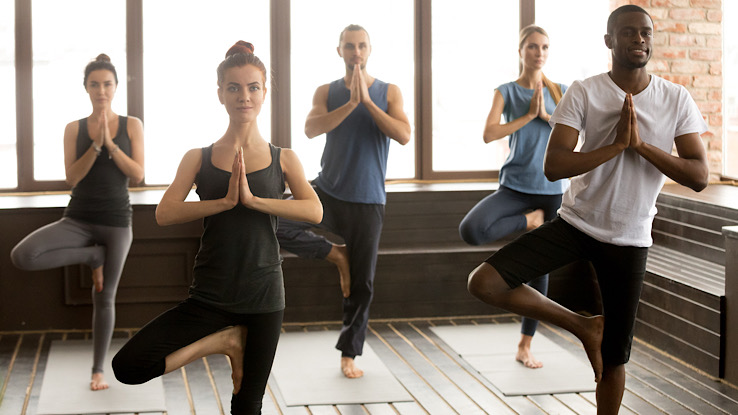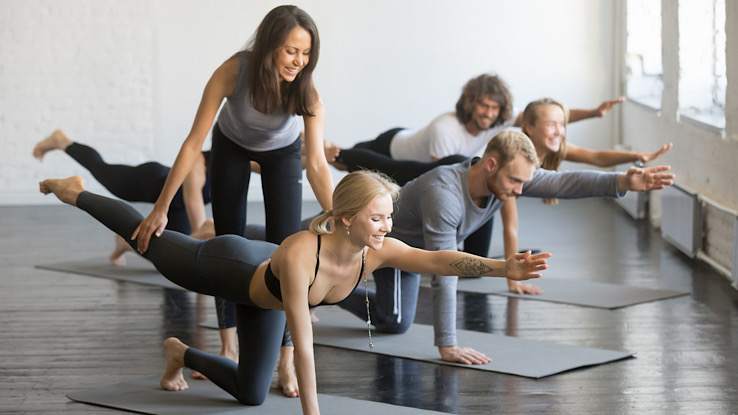Exercises Present Simple or Present Continuous

Yoga is becoming a popular way to stay active and in tune with our bodies. Whether you are an experienced yogi or trying for the first time— you have different types of yoga you can try. Here is a breakdown of the different types of yoga.
Yoga focuses on both the mind and body. Yoga is intended to reduce stress and anxiety — and many people enjoy these mental benefits. It also focuses on breathing techniques to help mental focus and relaxation. But it also physically increases your strength and flexibility.
Each type of yoga may have a different focus, including:
- Relaxation
- Cardio
- Muscle strength
- Flexibility
- Balance
You may try yoga to help with some symptoms of a chronic health condition, such as cancer, chronic pain, and depression. Yoga can also help with insomnia, fatigue, and your overall mood so you can better handle your chronic health condition.
Different Types Of Yoga
Yoga comes in many forms that focus on different techniques. Here are a few of the most common types of yoga:
Hatha
Beginners generally start here because the practice is gentle and slow. The focus of Hatha is on your posture and to have you hold positions for extended periods to build strength. Hatha also teaches you breathing and relaxation techniques.
Bikram
Bikram yoga is an intense workout in a hot room, so this type of yoga may not be for everyone. It is a type of hot yoga where the temperature in the room is about 105 degrees Fahrenheit and 40 percent humidity. You will want to drink a lot of water to stay hydrated if you try Bikram yoga. If you have health conditions, like heart conditions or heat intolerance, you may not want to try Bikram yoga. Other types of yoga may be good for you.
Ashtanga
This style of yoga is pretty new compared to some yoga forms that were practiced thousands of years ago. It also has more defined movements and has different levels, which you progress through over time. To progress, you have to master the poses and breathing techniques.
Iyengar
The main focus of Iyengar is to correctly do and hold poses for an extended time. You often use props such as blocks and blankets with this yoga type. Iyengar can help with chronic pain and injuries as it helps to strengthen your core and improves your flexibility.
Yin
Yin focuses on holding poses for up to five minutes. This helps blood flow and increases your flexibility over time. This style of yoga can help with relaxation and mental patience since the poses are held for a longer time. If you like Bikram, this type of yoga can be done in a heated room.
Prenatal
Prenatal yoga can help both before birth and after. This style focuses on breathing exercises and positions to help balance, strength, and endurance. It can also help with stress and reduce the pain associated with pregnancy.
Restorative
Restorative yoga is a great way to help you with an injury. This style of yoga has a more gentle pace that can be good for people with limited physical abilities. And, it's an excellent way to relax and reduce stress for everyone. There are only a handful of poses, each held for up to 20 minutes. Holding poses for a longer time can help with joint pain, stretch your muscles and calm your mind.
Tips For Beginners

If you plan to try yoga for the first time, there are a few things to keep in mind before starting:
- Make sure your instructor is certified.
- Find out if the class is for beginners or those who already have experience doing yoga.
- Purchase a yoga mat if one will not be provided in your class.
- Talk to your instructor if you feel any pain or discomfort during or after your sessions.
- If you have any chronic conditions or other health concerns, talk to your doctor before trying yoga for the first time.
Resource Links
- "Consumer Health" via Mayo Clinic
- "Different Types of Yoga and Their Benefits" via Atlantic Spine and Health Clinic
- "Yoga: What You Need to Know" via National Center for Complementary and Integrative Health
Source: https://www.thehealthfeed.com/healthy-living/different-types-yoga?utm_content=params%3Ao%3D1668962%26ad%3DdirN%26qo%3DserpIndex&ueid=e9c3035d-52b1-499b-90ae-ae20bb0b2c52
0 Response to "Exercises Present Simple or Present Continuous"
Publicar un comentario